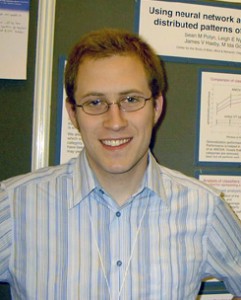Junior Faculty Teaching Fellow Spotlight: Sean M. Polyn
Each month, the CFT Blog highlights the work of our Junior Faculty Teaching Fellows. This month, Sean Polyn, Assistant Professor of Psychology talks about his teaching philosophy and interests.

My research focuses on how people remember things that happened to them recently. Since starting, I have taught Principles of Experimental Design twice. This is a mid-sized class (about 70 students) required of all Psychology majors, in which we explore how one does research in experimental psychology. With this class, there is the danger of the material being quite dry, so I attempt to enliven the classes and foster interaction and discussion with regular use of electronic clickers for polling student responses to on-screen questions. I spend a lot of time encouraging my students to take part in the class discussion. However, if one only listens to the students willing to talk in class, one can be misled regarding how much information the class is really comprehending. The students that are confused are often the ones least willing to admit it, as they have the very reasonable fear of having their confusion exposed to all the class members who aren’t having trouble with the material.
“I attempt to enliven the classes and foster interaction and discussion with regular use of electronic clickers for polling student responses to on-screen questions.“
Using the clickers, one can allow these students to have an anonymous voice, by putting a question on-screen and asking everyone to try to come up with the right answer. One of the innovations that I was most excited about this semester was using the clickers to run an in-class experiment. Students studied words presented in PowerPoint, and then used their clickers to say whether they remembered particular words that had been studied. We processed the data for the students, and made some assignments where they were able to carry out some analyses using Excel. One aspect of the experiment worked, and another part failed, but actually, that failure was even more of a teaching tool, since we were able to talk about how we could have changed the experiment to make it better!
This Spring semester, I will be teaching Foundations of Human Memory, a smaller class that will be much more discussion-centered. This is a class I have wanted to teach for many years, as it delves into the story of how our understanding of human memory has changed and grown through a century-plus of research into how people remember things. My goal for this class is to help my students create a framework to organize their knowledge about psychological research and about human memory, so they can go out into the scientific world and understand the research they read, and the results they create, and find that it is all part of a grand endeavor.

Leave a Response